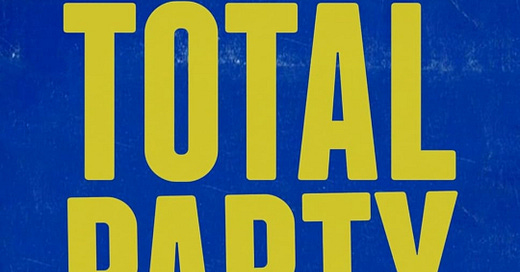Craig Francis Power’s Total Party Kill is a genre-defying meditation on addiction, trauma, and recovery, delivered with a rawness that feels both disarming and essential. Drawing heavily on the imagery and mechanics of Dungeons & Dragons (D&D), Power crafts a narrative that blurs the lines between reality and fantasy, inviting readers into a world where personal demons manifest as literal monsters and the quest for sobriety becomes a harrowing campaign.
The title, Total Party Kill, references a catastrophic outcome in role-playing games where every character perishes—a concept Power uses as a metaphor for the all-encompassing devastation of addiction. Through a series of interconnected poems and monologues, the collection explores the life of a speaker navigating rock-bottom moments, surreal underworlds, and tenuous steps toward healing. Power’s deft use of the D&D framework—complete with character archetypes, dice rolls, and chaotic encounters—provides a lens through which he examines the chaos and unpredictability of recovery. At one point, he writes, “The whole thing puts me in mind of a mosquito trapped in tree sap. A house sprung up from the ground like a holly bush wherein yellow jewels hop branch to branch, scarlet berries in their beaks,” using strong imagery to convey a profound sense of entrapment and fleeting beauty. This evocative language showcases Power’s ability to blend the surreal with the emotional, vividly conveying the speaker’s internal struggles and the disorienting complexities of recovery.
Power grounds fantastical elements in a gritty, lived reality. From dive bars to shadowy streets, the landscapes are at once physical and metaphorical, as Power writes, “Forced to leave the only home I’ve known, from the deck I saw my mother and my daughter down there waving from the docks, where their scarves blew straight out from the wind and the shadows of the birds whirled across the trembling boards.” This image of separation and departure effectively conveys the speaker’s inner turmoil, highlighting both the pain of loss and the enduring pull of love. These emotional descriptions immerse readers in the speaker’s emotional world, evoking empathy for their turmoil and gradual reclamation of agency. By intertwining the physical and metaphorical, Power effectively creates a tension that propels the narrative, echoing the duality of despair and hope that underpins the work.
“The collection’s language is visceral, employing a blend of vernacular grit and poetic precision.”
The collection’s language is visceral, employing a blend of vernacular grit and poetic precision. Power’s lines live somewhere between the sardonic and the tender, capturing the absurdity of existence alongside its fleeting moments of beauty. The speaker’s voice is unflinchingly honest, offering confessions and reflections that resonate with a deep authenticity. This candor, coupled with Power’s knack for metaphor and imagery, lends the work an emotional immediacy that is both haunting and cathartic.
Perhaps the most striking aspect of Total Party Kill is its refusal to offer easy resolutions. The collection mirrors the messy, nonlinear journey of recovery, where progress is punctuated by setbacks and the specter of relapse looms large. In this way, Power resists the temptation to romanticize sobriety, instead presenting it as a continuous, often grueling process.
The role-playing game of D&D becomes a metaphorical arena where the stakes surrounding substance use and redemption are heightened, allowing Power to explore themes of agency, fate, and the human capacity for resilience. The speaker’s encounters with monsters—both literal and figurative—serve as poignant allegories for the battles fought within oneself and the systems that perpetuate cycles of harm.
Power’s Total Party Kill is an ambitious and profoundly affecting work that resists easy categorization. Its hybrid form—part poetry, part narrative—mirrors the fractured, multifaceted nature of its subject matter. For readers willing to embrace its unconventional structure and unflinching exploration of uncomfortable truths, the collection delivers a deeply rewarding experience. While those familiar with D&D lore may better appreciate the nuanced depths of Total Party Kill, its universal meditation on addiction and recovery transcends its niche framework, offering insights that remain meaningful across a wide range of personal and emotional landscapes.
About the Author
Craig Francis Power (he/him) is a St. John's-based multidisciplinary visual artist and the award-winning author of three previous novels: Blood Relatives, The Hope, and Skeet Love. Total Party Kill is his first collection of poetry.
Book Details
Publisher : Breakwater Books (Oct. 18 2024)
Language : English
Paperback : 120 pages
ISBN-10 : 177853029X
ISBN-13 : 978-1778530296





